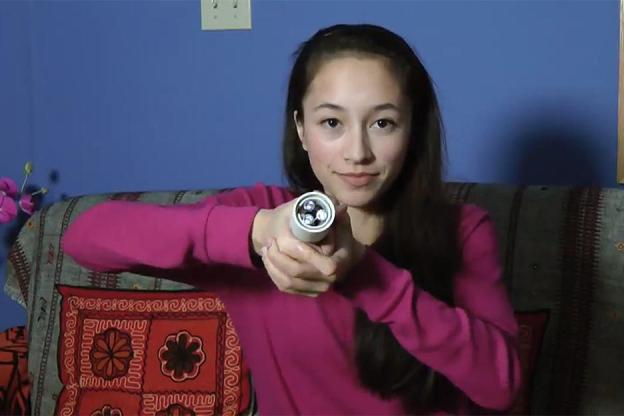
Think about all the accomplishments you’ve attained in your life – things like getting a college degree, buying a first home, landing the perfect job, or successfully modding your own supercomputer. Hold on to those thoughts tightly, because one teenage girl is about to make you feel like a complete underachiever.
At the age of 15, Ann Makosinski of Victoria, British Columbia is one of the 15 finalists for this year’s Google Science Fair competition. Her project: A modded flashlight powered by the heat produced within the holder’s palms. Since the sixth grade, Makosinski says she has been interested in alternative energy and wanted to figure out a way to generate power from a source that’ll last as long as humans live. Her research brought her to the concept of Peltier tiles, which produces energy when one side of the tile is heated and the other side is cooled. To get the tiles to create more voltage, Makosinski spent years reworking the circuit until it provided enough power to light an LED.
“This took quite awhile ’cause I had to do it during the school year as well and I had homework, plays, whatever that I was also doing,” she told CBC News. Her speech still hints of adolescence. “You just kind of have to keep going.” Despite her parents’ lack of post-secondary science education, they’ve always encouraged Ann to pursue her passion for the subject. In fact, her father helped her order various Peltier tiles off eBay so she could continue her experiments.
In the end, the working prototype is an aluminum tube and PVC tube, both working together so that the hollows would allow air to cool one side of the Peltier tile while the user’s hand transfers heat to the other. In her tests, Makosinski found that the flashlight worked better at 5 degrees Celcius (41 degrees Fahrenheit) because it allowed the cooler air to circulate, generating more power. But even at 10 degrees Celcius (50 degrees Fahrenheit), the light maintained a steady glow for more than 20 minutes.
Makosinski will be traveling to Mountain View, CA to present her project to Google this September. If she wins the grand prize, she’ll walk away with $50,000 and a trip to the Galapagos Islands. With the production cost per flashlight at approximately $26, Makosinski will be able to make lots of devices if she wins – and one would imagine economy of scale should make mass production even cheaper for customers.
Watch the young scientist explain her project in the video below.


